| |
|
| Defining Fields |
 |
|
When form is printed that contains objects that merge data from a file,
FoD-OMR opens the file and extracts the required data from
defined fields, the number of lines in the file (records) determines
the number of forms that are printed.
When you define the structure of your data file,
each field is labelled, and the information contained in the fields can
be displayed in several places on your form, and in different formats
(such as both a barcode and a matrix zone).
Before you defined your fields, it is recommended
you have a sample data file handy to reference the fields in each
record.
|
| Defining fields for delimited data
formats |
|
To define fields for delimited data formats, select External
Data from the Tools menu to open the Field
Definitions dialog box.
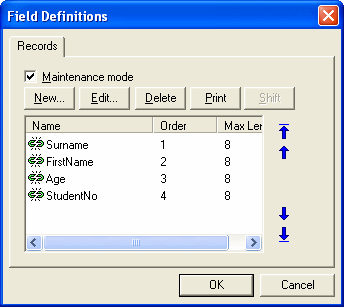
- Click New to create a
new field.
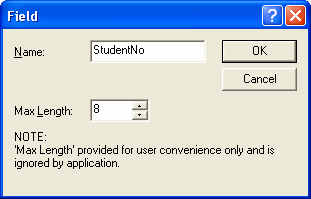
- Type a Name
for the field. If you are using a Separated data format with headings
enter each column heading as a field name. At merge time OMR
D&P will identify each column using these heading and extract
the information into the fields on the form.
- You do not have to set a
start position
or length for fields in a separated data file as these are
automatically detected by FoD-OMR, but it is good practice to
enter the length as an aid to defining the correct length of the field.
The arrows     at the right of the box are used
to adjust field order. Order is not required for files with first row
headers (where the row names and the names of the fields must match
exactly), but is required if the file does not carry the header line. at the right of the box are used
to adjust field order. Order is not required for files with first row
headers (where the row names and the names of the fields must match
exactly), but is required if the file does not carry the header line.
|
|
| Top
|
| Defining fields for fixed data formats |
|
To define fields for fixed data formats, select External Data
from the Tools menu to open the Field Definitions
dialog box.
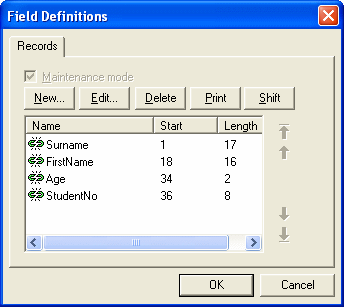
- Click New to create
a new field.
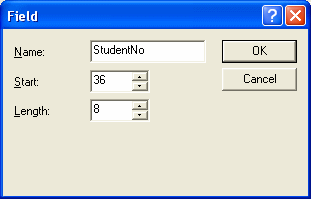
- Type a Name
for the field. This label is then available as a link selection.
- If the field is in a
fixed data file,
enter a Length for the field and a Start
position if the field does not immediately follow the preceding one.
The Start position is automatically updated when
more fields are defined.
|
|
| Top
|
| Editing fixed fields |
|
If your data is extracted from a fixed data file, you can easily change
the positions of the fields in each record by selecting the field and
clicking the Edit button.
To change the start position of a particular
field, and automatically update the start positions of all the fields
that follow it, click Shift button and enter an
offset to increase or decrease the start position.
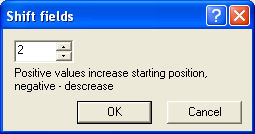
|
|
| Top
|
|
|
|


